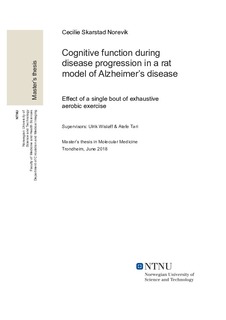| dc.description.abstract | Alzheimer’s disease (AD), the most prevalent form of dementia, is a devastating neurodegenerative disorder affecting over 35 million people worldwide. As age is the main risk factor for AD, and no current treatment options are effective, one expects a substantial increase in the prevalence of AD, alongside the rapidly aging population. However, promising studies suggest that exercise may ameliorate or prevent the progression of AD. Even a single bout of exercise can give acute beneficial neurological changes. It is hypothesized that exercise-induced blood borne factors can exert protective effects on neurons. Based on this, there is evidence to suggest that even one single bout of exercise could have a positive effect on short-term cognitive function.
This project aimed to characterize cognitive function during disease progression and the potential effect of a single bout of exhaustive aerobic exercise in a transgenic rat model of AD, McGill-R-Thy1-App. This project consisted of two studies. Study 1 was a characterization of cognitive function in the aging AD rat model at 3, 6 and 12 months of age, fitness level and presence of amyloid plaques in the brains of rats at 6 and 12 months of age. The aim was to determine cognitive function using the Novel Object Recognition test (NORT) and Novel Object Localization test (NOLT), fitness level measured as peak oxygen uptake and amyloid plaque load in coronal brain sections stained with 3,3'-Diaminobenzidine (DAB) and McSA1. It also aimed to refine the two cognitive tests used. Study 2 aimed to determine the effect of a single bout of exercise on cognitive function in the AD rat model at 6 and 12 months of age.
Cognitive impairment was evident from 3 months of age, however the cognitive test results did not show further impairment at 6 and 12 months, and rats aged 12 months were too sedentary for effective testing. The NORT engaged the rats to a greater extent than NOLT. Amyloid plaque pathology was present in brain sections from transgenic rats at 6 months of age, mainly in the subiculum, but also the dentate gyrus, CA1 and entorhinal cortex, while at 12 months they had large amounts of amyloid plaques in those areas, as well as in several other brain regions. The visually estimated amount of amyloid plaques found seemed to increase with decreasing cognitive function. One bout of aerobic exercise at 6 and 12 months of age was not sufficient to improve cognitive function with the current protocol and exercise program. | nb_NO |
